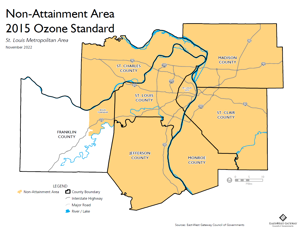The Clean Air Act requires the U.S. Environmental Protection Agency (EPA) to set standards (concentration limits) for pollutants considered harmful to public health and welfare. Six criteria pollutants have a National Ambient Air Quality Standard (NAAQS) — ozone, particulate matter, carbon monoxide (CO), lead, nitrogen dioxide (NO2) and sulfur dioxide (SO2). For additional information on the NAAQS, visit the EPA website.
The standards must protect sensitive populations including children, elderly, and people with existing heart and lung disease. Over time, the EPA has revised and strengthened NAAQS to better protect public welfare from known or anticipated adverse effects. Transportation-related pollutants of concern are ozone and fine particulate matter (PM2.5).
Currently, seven counties and one township in the St. Louis region have been designated by the EPA as not attaining the 2015 eight-hour ozone standard of 70 parts per billion (ppb).
Click on the map below to enlarge the image
Ozone
Ozone exists in both the upper and lower atmosphere. The ozone layer of the upper atmosphere (10-30 miles up) occurs naturally and shields the Earth from harmful ultraviolet radiation. However, ozone in the lower atmosphere (ground-level zone) is manmade and creates a variety of health problems.
PM2.5
Particle matter is a mix of solid particles and liquid droplets suspended in the air. Fine particulate matter is considered to be less than or equal to 2.5 microns in diameter (about 1/30 the width of a human hair). Many man-made and natural sources emit particulate matter directly or emit other pollutants which have a chemical reaction in the atmosphere to form particulate matter.
Other Criteria Pollutants
In addition to ground-level ozone and particulate matter, the other criteria pollutants in the NAAQS are also tracked and monitored according to their own standards. These criteria pollutants include: carbon monoxide (CO), lead, nitrogen dioxide (NO2) and sulfur dioxide (SO2).


